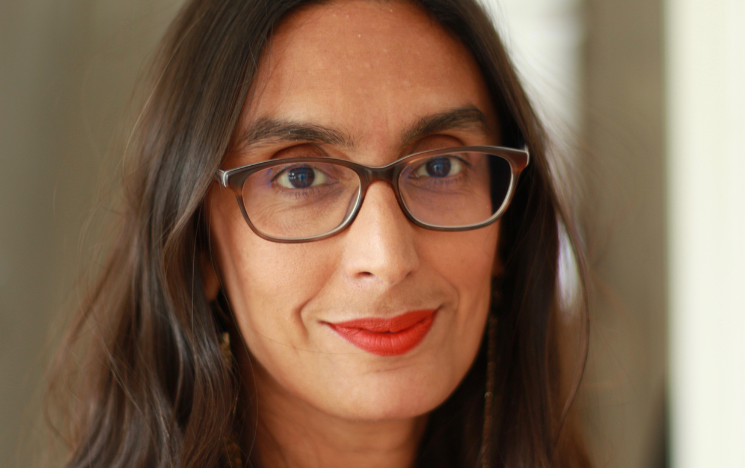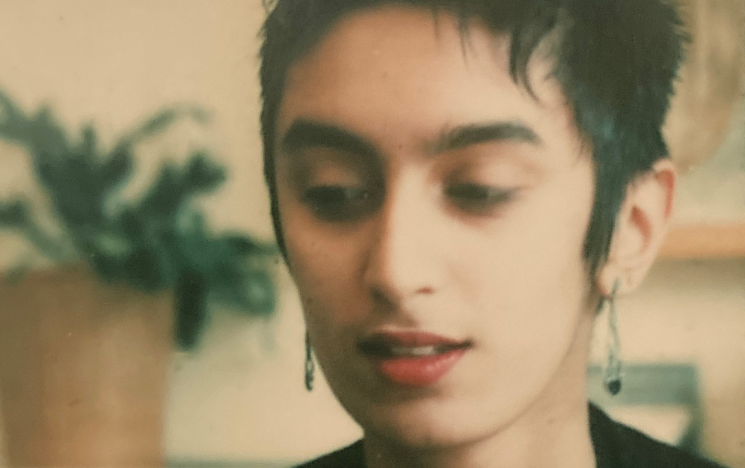Sheela Banerjee
Sheela Banerjee (AFRAS 1986) is a journalist and academic who worked for many years at the BBC and Channel 4 crafting intimate portraits of individual’s lives. Her debut book What’s in a Name? unravels the personal histories of her family and friends through their names.

Sheela's story
After graduating from Sussex in 1989 with a BA in Politics, Sheela started a career in journalism, working at Britain’s first major Asian radio station, Sunrise Radio. She went on to work in TV, making films for the BBC and Channel 4 that showcased powerful stories, such as agony aunt Claire Rayner’s recovery from breast cancer treatment.
Fulfilling a long-term desire to study English, Sheela completed an MA in Twentieth Century Modernist Literature followed by a PhD on Virginia Woolf and T.S. Eliot at Queen Mary University of London. She continued writing, publishing articles in The Guardian, including one about the history of her name. Sheela was then approached by a literary agent and subsequently landed a book deal.
What led you to study at Sussex?
I was very politically active but nobody in my family had gone through the British university system and so I didn’t really know what I was doing. I remember just really liking the lecturer who interviewed me, and after our chat I realised Sussex was the place for me.
Favourite spot on campus?
In the summer we used to hang out outside Falmer Bar with our pints or we’d sit on the grass in front of Essex House. We also spent a lot of nights down in The Crypt!
After graduating you worked as a journalist, what drew you to the industry?
When I left Sussex, I really wanted to make documentaries, but I didn't have any idea how to go about it – and I didn't have any connections. A good friend of mine, Maria, and I somehow managed to get funding from the Arts Council to make a film about local Bangladeshi women in Brighton.
After that I applied to go to Journalism College at Cardiff and got sponsorship from Channel 4. That initially set me up, but it was hard as I didn’t have any contacts and didn’t really know how to go about getting a foot in the door.
As someone who’s from a minority it was a gruelling, hard industry to be in in the '90s and early 2000s. But I learnt a lot from it, and I learnt how to tell stories.
What prompted you to explore the history of your name further?
Words and the power of language were things I had been thinking about throughout my PhD. I also used names as an icebreaker when I taught. I’d get the students to tell me their name and something interesting about themselves. I realised there is so much in people’s names – and so many interesting stories came out of those little icebreakers.
Everybody’s got a name and everybody’s name tells a story. It tells a story at the most basic level – race, class, gender, nationality, which bit of the country you live in, but also the history of colonialism and slavery.”
SHEELA BANERJEE
Your first book What’s in a Name? has recently been released. What was the writing process like?
During writing the proposal for my book, I started thinking about my friends and suddenly realised that all of them had amazing stories within their names. Once you start thinking about somebody's name, especially if they are of immigrant or mixed-race heritage, there are quite dramatic and interesting stories there.
It’s such a universal subject. Everybody’s got a name and everybody’s name tells a story. It tells a story at the most basic level – race, class, gender, nationality, which bit of the country you live in, but also the history of colonialism and slavery.
As a passionate advocate for non-English names being pronounced correctly, can you tell us more…
It's natural to find names that are in a different language slightly difficult to say, but I really think it's important to try and get them right. I've seen the effect it has first-hand on my family. My dad’s name is Balaji Prasad Banerjee, and nobody would bother trying to say it correctly, and at the very worst they would constantly mispronounce, mangle and mock it. This meant he just shortened it to Bala, and I never heard him say his original name. Balaji comes from Hindu mythology and the Hindu belief system and is another name for the god Vishnu. Bala doesn't really mean anything in Bengali.
My cousin Mousumi had to shorten her name to Mo. My mum has never had her name pronounced properly. A name is a vital part of your identity, and it immediately puts you at a disadvantage in a social situation if people are constantly saying your name wrong. It’s really important for children at school that their teachers pronounce their names properly.
What experiences from your time at Sussex have stayed with you?
One of the first ever seminars that I had was with Homi K. Bhabha. It was the first time I’d seen a teacher or authority figure who had brown skin, and he was also amazing.
Another lecturer I really enjoyed learning from was Partha Mitter, a fellow Bengali. I used to love the small seminars in his office talking about Indian art and the depictions of India by colonial travellers.
At Sussex I studied colonialism – it jolted me awake to the racism I had experienced and grown up with. I saw that what I had taken very personally and had been ashamed of was part of a much larger picture of post-colonial, post-imperial politics in this country.

Sheela Banerjee in the 1980s during her studies at Sussex
What advice would you give to yourself if you could go back and start university again?
Choose the subject that you absolutely love to study. I was very political, but I shouldn't necessarily have studied politics. Make sure you're doing a subject that you genuinely enjoy studying.
Really make the most of it. You’ve got that time, those resources, the lecturers, the other students, the books – really utilise it.
Sheela's debut non-fiction book What's In A Name? is available to order here. You can also read articles Sheela has written about speaking Bengali to her daughter and how the sari connected her to her past through the links provided.
Sheela is among thousands of inspiring alumni on Sussex Connect. Join now to seek mentoring and industry advice and get a head start on your career.